Theresa May has long been clear about what sets her apart from other politicians: she doesn’t play political games. When she launched her bid for the top job last year, she was clear that — unlike her rivals — she hadn’t succumbed to the temptations of Westminster. She told us that she didn’t drink in the bars or gossip over lunch. She invited the TV cameras into her first Cabinet meeting as Prime Minister to record her telling ministers that ‘politics is not a game’.
The danger for May in calling an election three years ahead of schedule is that it looks a lot like game-playing. Has a 20-point poll lead proved too much of a temptation, even for this vicar’s daughter?
James Forsyth discusses the snap election with Bobby Duffy from Ipsos MORI and Richard Angell from Progress:
This sense is compounded by the fact that there is no obvious casus belli for an election. May had stressed that the country needed a period of stability — so there would be no early election, no matter how politically advantageous it would be to her and her party. It is not immediately apparent what has changed. There has been no totemic Commons defeat for the government. The Lords has, so far, backed down on Brexit whenever the elected House has asked it to.
The debate over whether or not to go to the country has been going on for weeks in Downing Street. It is a far riskier decision than the polls — with their handsome Tory leads — suggest.
Those close to May point to three important factors behind her change of heart. One is that she wants to increase her majority. Although May has suffered no Commons reverses, she has felt herself hemmed in by the tight parliamentary arithmetic on a whole series of issues. She worried, in particular, about getting all the Brexit legislation through with such a narrow advantage in the Commons. ‘It turns out triggering Article 50 really was the easy bit,’ remarks one of the few consulted about the decision. There is also a feeling in Downing Street that with the backing of both a referendum and a general election, the House of Lords will find it hard to justify delaying or amending Brexit legislation over the next few years. Then there is May’s desire for her own mandate. Until now, her hands have been tied by pledges made in the 2015 Tory manifesto, into which she had minimal input; the document was drawn up by the Cameron inner circle. May’s other problem was that whenever she tried to advance her own, non-Brexit agenda, the House of Lords was free to obstruct it on the basis that it hadn’t been in the Tory manifesto. The election will solve this problem for her. She’ll have her own manifesto to beat the Lords over the head with. Victory will also mean that Nicola Sturgeon will no longer be able to taunt her as an unelected Prime Minister; I’m told that the First Minister’s jibe came close to getting under May’s skin.
The third reason is Brexit. As soon as May announced she was going to trigger Article 50 by the end of March this year, there was always going to be a dead period in the Brexit negotiations between then and the election of a new German government this autumn. This, as one of May’s closest Cabinet allies puts it, created a window for an early election. If May was to go for it, it had to be before September. The thinking in No. 10 is that this election will show the EU that Britain really is leaving and won’t change its mind. Perhaps most importantly, it also gives May more flexibility on the timings. I understand that the Brexit Secretary David Davis has been one of the most ardent advocates of an early election, arguing that ‘there would never be a better moment’ than this. As things stood, the Article 50 deal would have to be concluded by the end of March 2019 — and then there would be a general election campaign just a year later.
Now, May will have a few years between the Article 50 deal and the general election. This makes it more likely that she’ll have been able to agree on the full details of Britain’s new relationship with the EU before she goes to the country again. It also makes it fairly risk-free politically to have a transition period, or what May calls an ‘implementation period’, until 2022, during which free movement and the jurisdiction of the Court of European Justice could continue. It was this issue of Brexit and timings that weighed most heavily on her, according to one of her closest Cabinet allies.
A Prime Minister going for an election when her party is 20-odd points ahead in the opinion polls doesn’t seem much like a gamble. That’s especially true when more than half of the leader of the opposition’s own MPs don’t have confidence in him. But this decision is the riskiest one that Theresa May has taken since entering No. 10.
If May were to lose her reputation as the serious grown-up of British politics, any general election victory would come at a cost for her personally. The May brand that has proved so potent would have been tarnished and her prime ministerial honeymoon would be over.
Those involved are confident that her reputation won’t be damaged. One of them tells me that the voters will believe May when she says she’s reluctant to have an election — because that’s the truth. They argue that her sincerity will be apparent: and the public will accept her argument that she is going to the country reluctantly, not opportunistically. Interestingly, the initial polling evidence suggests that the public are happy with May’s decision.
There are, though, four other major risks for May. The first is that expectations get out of control. Already there are people in Westminster talking as if a 100-seat Tory majority is a given, because of the ineptitude of the official opposition. One sympathetic Tory MP observes that she’ll be judged against the Thatcher and Blair landslides because of Labour’s weakness.
May’s loyalist allies are busy trying to pour cold water on this talk. One tells me that a majority of ‘35 to 40 would be absolutely fantastic’. The argument goes that this majority is a ‘different world’ from the current one of 10 to 12 and would make it much easier for the government to get its business through. But, as one minister concedes, if the majority is less than 50, May’s gamble in going for an election will not be seen as a success.
The next risk is Scotland. At the last general election, the Scottish National Party won 56 out of the 59 seats in Scotland. If they pull off a similar performance this year, it will be that much harder for May to continue to refuse Nicola Sturgeon’s demand for talks on a second independence referendum. May needs the Unionist parties in Scotland to make significant gains if it is to remain ‘reasonable’ for the UK government not to agree to a second independence referendum.
Another danger for May is that this election revives the Liberal Democrats. For more than a decade the Tories tried to destroy the Japanese knotweed of British politics. But this election offers Tim Fallon’s party a chance to revive itself after the disastrous performance of 2015. Many of the seats it lost, such as Bath, Cheltenham and Twickenham voted Remain, which gives the party — the Ukip of the 48 per cent — an obvious selling point. Even in those west country seats that voted Leave, the Liberal Democrats have something to work with. As the SNP showed in 2015, 40-odd per cent of the vote won’t win you a referendum, but it can get you a lot of parliamentary seats.
Realistically, the Liberal Democrats won’t do anywhere near as well as that. Most voters want Brexit to happen rather than for the debate to be reopened. The Liberal Democrats are also stymied by the fact that the Tories will claim, as May did in her election announcement, that anyone opposing them is backing Corbyn to be Prime Minister. On top of this, there is the fact that the Lib Dems can’t fight every seat like a by-election. But it would be a major surprise if the Liberal Democrats didn’t more than double their number of MPs at this election.
Senior Tories reckon, however, that even if a dozen or so seats are lost to the Liberal Democrats they will be more than made up for by their gains from Labour. The Copeland by-election, where the Tories easily overturned a two and a half thousand Labour majority, suggests that scores of Labour seats could fall to the Tories. Indeed, the Tories have more opposition research on Jeremy Corbyn and John McDonnell than they know what to do with. The biggest concern among Tory MPs about Corbyn is actually that the idea of him as Prime Minister is ‘not a credible threat’, as the polls indicate he has no chance of winning. This, they fear, means they won’t be able to get voters to concentrate on what he’d do both in Downing Street and to their finances.
The final risk for May is personal. As soon as this election has been fought, Westminster will start gossiping over lunch about whether she’ll fight the next one. It will be pointed out that she’ll be 65 by 2022 and people will ask whether she’ll really want to do another term. If this kind of talk takes hold, it can drain authority from a prime minister very quickly. But set against these risks is May’s chance to realign British politics. She has an opportunity to both unite the right and to shatter Labour’s traditional electoral coalition.
After the referendum, Ukip is a party without a purpose. Its new leader, Paul Nuttall, doesn’t have the reach of a Farage and is, anyway, more interested in chasing Labour voters than Tory ones. May has a chance to win back those Tories who have drifted away from the party because of the EU issue over the last 20 years. That is now resolved — and she is delivering Brexit.
This fracture on the right has prevented the Tories from polling over 40 per cent at a general election for a quarter of a century. May has been handed the perfect opportunity to put this electoral bloc back together.
At the same time, Brexit and Jeremy Corbyn’s leadership have given her a chance to shift a substantial number of traditional Labour voters into the Tory column. She can steal a large chunk of Labour’s working-class, patriotic base who won’t fancy voting for a man who courted the IRA as they killed British soldiers and who calls Hamas and Hezbollah his friends. Her ‘third way’ between nationalism and globalism, with its emphasis on making globalisation work for those who feel left behind, gives her more of an appeal to these voters than any Tory leader this century.
If May can smash Labour’s traditional electoral coalition, the early election will have been worth the risk. Don’t bet against her pulling this off. As her opponents for the Tory leadership can attest, May might decry political game-playing, but she is good at it.
Got something to add? Join the discussion and comment below.
Get 10 issues for just $10
Subscribe to The Spectator Australia today for the next 10 magazine issues, plus full online access, for just $10.
You might disagree with half of it, but you’ll enjoy reading all of it. Try your first month for free, then just $2 a week for the remainder of your first year.


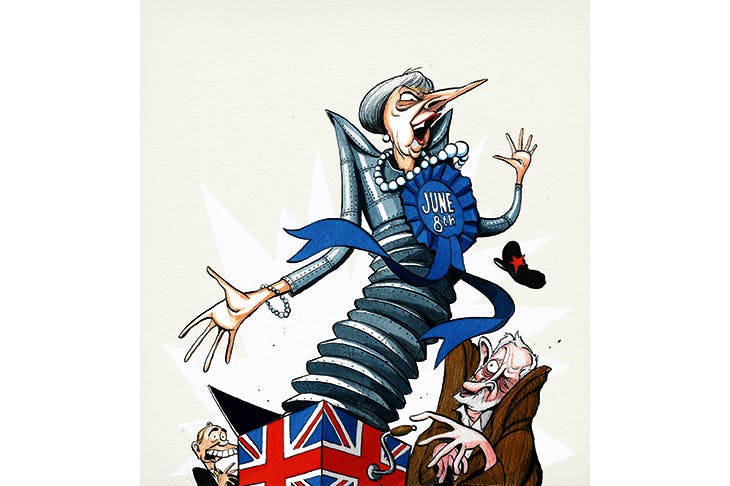

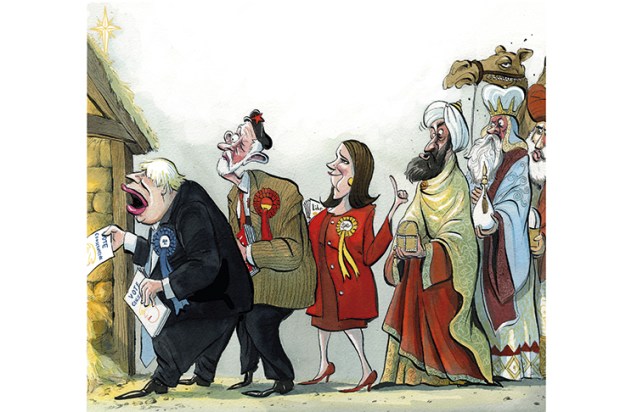
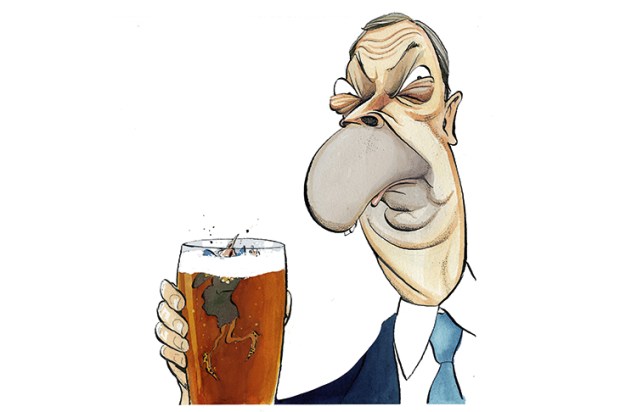
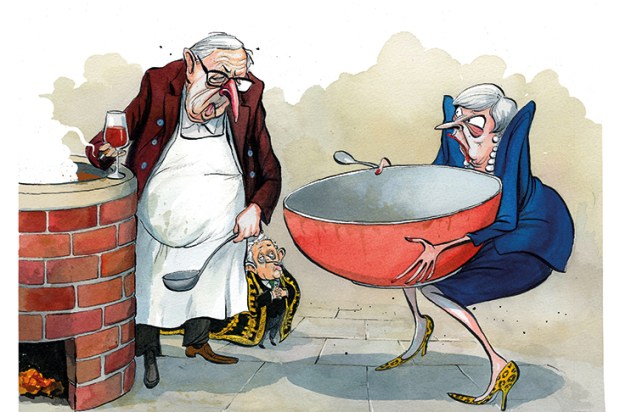
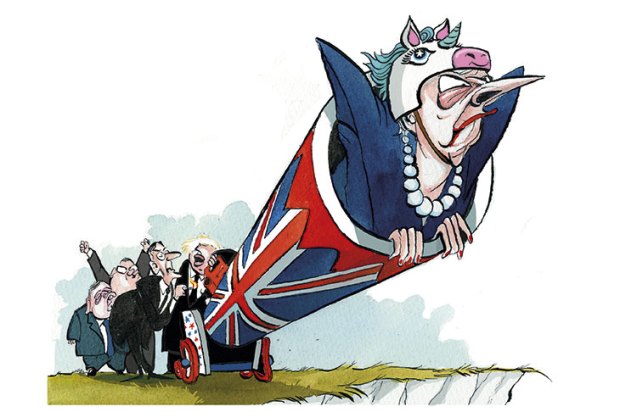
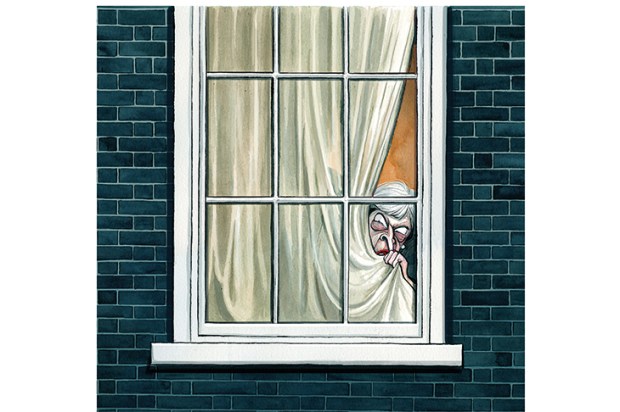






Comments
Don't miss out
Join the conversation with other Spectator Australia readers. Subscribe to leave a comment.
SUBSCRIBEAlready a subscriber? Log in